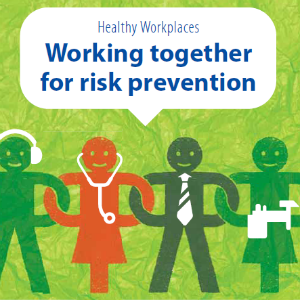-
Advocacy Theme
-
Tags
- Abortion
- Adoption
- Caregiving
- CEDAW
- Disability
- Domestic Violence
- Domestic Workers
- Harassment
- Healthcare
- Housing
- International/Regional Work
- Maintenance
- Media
- Migrant Spouses
- Migrant Workers
- Muslim Law
- National budget
- Parental Leave
- Parenthood
- Polygamy
- Population
- Race and religion
- Sexual Violence
- Sexuality Education
- Single Parents
- Social Support
- Sterilisation
- Women's Charter
A safe workplace is free of sexual harassment
April 30th, 2013 | Employment and Labour Rights, Letters and op-eds, News, Views, Workplace Harassment
By Intan Wirayadi, Corinna Lim and Vivienne Wee
To eliminate WSH, all stakeholders must be engaged. Companies should adopt zero tolerance to WSH and instate policies, procedures and training for staff to deal with this. AWARE has provided training to 36 companies, at their request, on how to handle such incidents and to promote awareness of WSH to their employees.
 The International Labour Organisation (ILO) has designated 28 April 2013 as World Day for Safety and Health at Work. The ILO has identified workplace sexual harassment (WSH) as a cause for a “hostile working environment in which the conduct creates conditions that are intimidating or humiliating for the victim”, with negative impacts on the economy and society.
The International Labour Organisation (ILO) has designated 28 April 2013 as World Day for Safety and Health at Work. The ILO has identified workplace sexual harassment (WSH) as a cause for a “hostile working environment in which the conduct creates conditions that are intimidating or humiliating for the victim”, with negative impacts on the economy and society.
In 2008, AWARE conducted a survey to ascertain whether sexual harassment is an issue in Singapore’s workplaces. Five hundred individuals and 92 companies participated in the survey. The results showed that 54.4% of the 500 respondents had experienced some form of workplace sexual harassment; 25% knew of others who had experienced this; 30% of those who had been harassed had been harassed several times; 12% of those who were harassed received threats of termination if they did not yield to the harassers. 79% of victims were female, 21% were male.
It is apparent from these figures that WSH is a problem in Singapore and measures are required to prevent it and protect employees’ well-being.
In November 2012, AWARE released a second WSH Report focusing on the inadequacies of current laws to deal with this problem. For example, criminal proceedings may not be the best course of action as while they might punish the perpetrator, they do not prevent or stop WSH. They also do not provide any compensation to the victims for their mental or physical sufferings. It is therefore important to institute a broad range of civil remedies and sanctions that address workplace sexual harassment.
WSH victims currently have few options for recourse as most companies in Singapore, including government bodies, do not have substantial internal policies dealing with WSH. Further, there is no law or regulation that requires companies to adopt effective WSH policies. Victims of WSH thus silently suffer the consequences of the crime perpetrated on them with impunity, and perpetrators most often do not suffer any consequences from their wrongful actions.
 WSH survivors suffer negative health consequences and financial burdens because of the lack of an adequate legal framework in Singapore to deal with WSH effectively, compounded by social norms that prevent them from seeking justice. Female WSH survivors are often blamed by society for ‘asking for it’, while male WSH survivors may be reluctant to speak out because social conventions reject the idea that men can be victims of sexual harassment.
WSH survivors suffer negative health consequences and financial burdens because of the lack of an adequate legal framework in Singapore to deal with WSH effectively, compounded by social norms that prevent them from seeking justice. Female WSH survivors are often blamed by society for ‘asking for it’, while male WSH survivors may be reluctant to speak out because social conventions reject the idea that men can be victims of sexual harassment.
WSH survivors need sufficient support from their employer and the state. Data from many countries indicate that WSH hurts the economy substantially. For example, a survey of the US Merit Systems Protection Board showed that between 1992 and 1994, it cost the US government approximately USD 327 million to deal with WSH, including costs of sick leave, job turnover, and loss in productivity. A study should be conducted in Singapore to document the direct and indirect costs of WSH on individuals, families, companies and the Singapore economy as a whole.
To eliminate WSH, all stakeholders must be engaged. Companies should adopt zero tolerance to WSH and instate policies, procedures and training for staff to deal with this. AWARE has provided training to 36 companies, at their request, on how to handle such incidents and to promote awareness of WSH to their employees.
 Although sexual harassment is under-reported worldwide, the situation is worse in Singapore, due to the lack of adequate legislation or corporate policies against it. S.H.OUT (Sexual Harassment Out) is AWARE’s campaign to make workplace sexual harassment more visible, with the long-term aim of getting rid of it altogether.
Although sexual harassment is under-reported worldwide, the situation is worse in Singapore, due to the lack of adequate legislation or corporate policies against it. S.H.OUT (Sexual Harassment Out) is AWARE’s campaign to make workplace sexual harassment more visible, with the long-term aim of getting rid of it altogether.
As a result of this campaign, to date, nine companies have declared zero tolerance of WSH, and 1383 people have signed AWARE’s petition calling on the Singapore Government to put in place effective anti-sexual harassment legislation and procedures to stop WSH, in line with our international obligations under the Convention on the Elimination of All Forms of Discrimination against Women (CEDAW). The Inter-Ministry Committee on CEDAW, the Office for Women’s Development and the Ministry of Manpower have said that they will look into possibilities for progress in this and other areas.
Workplace sexual harassment is a problem not just for unfortunate victims but for all Singaporeans. A safe workplace is indispensable to employees’ well-being, enabling them to contribute to a viable and sustainable Singapore economy. The promotion of safety and health at work must include comprehensive measures to prevent sexual harassment, including the establishment of an administrative body with resources and competence to handle complaints and to promote application of the law against sexual harassment.
This World Day for Safety and Health at Work, we call upon Singapore state and society to take WSH seriously so that we can build inclusive workplaces for all.
Intan Wirayadi is a member of AWARE’s Workplace Sexual Harassment Sub Committee. Corinna Lim is the Executive Director of AWARE and Vivienne Wee is the Research & Advocacy Director at AWARE. This article was first published in Today on 29 April 2013. Read the published version here.




2 thoughts on “A safe workplace is free of sexual harassment”
Comments are closed.